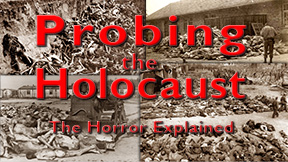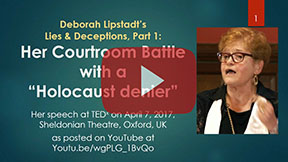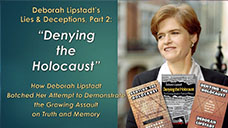This essay is the continuation of the essay “Fleeing From England.”
Back in Rosarito, Mexico, it lasts only a few days for me to drop into a hefty depression. Nothing seems to function anymore: my family has been destroyed, except for the 75 year old Bradley I have no social contacts at all, my company slowly but surely goes down the drain because nothing works properly due to the lack of infrastructure in Mexico, and there does not seem to be a silver lining at the horizon giving me any hope that I will get out of this dirt hole again. On August 29, 2000, I send an appeal for help to several friends by email, because I feel like I am drowning in the dust and soot of Rosarito.
But I have to add one thing here: I am so grateful to have Bradley around me at this hour. He lifts me up, occupies my time, keeps me alive. Without him as a neighbor I would have felt utterly lost.
And then, out of nothing, the pertinacious Andrew Allen pops up again: “Let’s try it with an application for political asylum now. You really have good chances,” he writes in en email.
“Oh well. I guess I am in a situation now where I have to resort to this last ditch effort,” I reply, and so we get down to finding out what we have to do in order to prevent that we botch it right at the beginning for formal reasons. After all, Andrew is no expert for immigration law either.
During the following weeks I keep myself busy doing mainly three things: The desperate attempt to build up hope for a life after Rosarito – or at least the illusion of it – by way of internet dating websites; improving my fitness by jogging along the beach of Rosarito; and with research and all sorts of odd jobs in preparation of my asylum application: gather documents proving my persecution, finding evidence for political persecution in Germany in general, and then translating it all into English. I also “squander” some time working for Bradley and his website www.codoh.com as well as for my own website www.vho.org. In addition I prepare a new German edition of my expert report for publication and send it to the printer in England in early October 2000. Working for the issue no. 3 of 200 of my German magazine, however, feels like a punishment at the moment, so I skip it.
One question bothers me most, which has worried me each time when filling out a visa waiver form while entering the U.S.: what exactly is a “crime of moral turpitude”? Because if one has committed such a crime, one is neither entitled to a visa waiver nor is it likely that one can obtain political asylum. Hence I try to find a definition for such crimes over the Internet.
I quickly find a collection of several hundred U.S. court cases dealing exclusively with defining what constitutes a „crime of moral turpitude.” After skimming through a few hundred cases it is safe to say that a free speech offense similar to that for which I was sentenced in Germany does not even exist in the U.S. I thus have not committed a crime of moral turpitude according to U.S. law. What a huge relief: my answers when filling out those visa waiver forms has always been correct, and there is no formal obstacle excluding me from political asylum.
Early October I start packing up my things. My visa waiver from my trip to Iceland expires on November 8, which means that everything will have to have happened until then, because I don’t feel like asking for political asylum at some border station in the Mexican desert, as a result of which I may be held there for many weeks. I prefer filing my application from a temporary residence within the U.S.
I cannot resist, though, trying to get a new visa waiver. Bradley and I therefore drive to the border at Tijuana one day in order to go shopping on the other side. At the border I don’t show my still valid via waiver on purpose but ask the border official for a new one instead. She looks critically at my passport, leafing through it to the last page. Then she grabs her walkie-talkie:
“We have a chap here with a lot of immigration stamps and a note of a denied visa application. Should I send him over to you?” she talks into it.
“Oh dear, that sounds like trouble,” Bradley whispers to me.
“What will we do if it doesn’t work out?” he asks me.
“Then I walk to the pedestrian section over there and pass through with my old visa waiver. You simply drive through and pick me up on the other side,” I suggest to him.
“OK”
The border official asks Bradley to pull over to a special parking lot, where another official is awaiting us already.
“Please give me your passport and stay inside the car.”
The official leaves to his office with my passport in hand. Bradley and I look at each other in surprise. So far we never had to remain in the car.
“I hope that nothing worse will happen,” I say slightly nervously.
“But what could happen? They can’t do more than turning you down.”
“Of course they can. For example they could arrest and extradite me based on a German arrest warrant.”
After a few minutes the official comes back:
“According to the stamp at the end of your passport a visa application was denied to you by the U.S. consulate in Tijuana in February. This means that we are not allowed to issue you a visa waiver,” he explains.
“Wait a minute! The lady at the U.S. consulate had explained to me explicitly that this is not a denial. She even explained that I ought to come to the border here in order to obtain a visa waiver.”
“That may well be. But the stamp in your passport only mentions that a visa was denied. No reason is given, and according to the law we cannot issue visa waivers to individuals who have ever been denied a visa.”
“I don’t believe this. How can that lady at the consulate refuse to accept my visa application and at the same time ask me to get a visa waiver here at the border?” I ask the official.
“I am inclined to believe you, sir. We frequently have cases here where the guys from the consulate have botched it. They are employees of the State Department who have no idea about the rules of the immigration authorities, which are part of the Department of Justice.
We have now added an entry on the first visa page of your passport pointing to the entry on the last page. I now have to ask you to come with me. I will now escort you back to Mexico.”
That was it, then. All doors to the U.S. are now closed, except for political asylum, maybe.
“That’s really great. May I at least give my friend here some instructions about our planned shopping spree?” I ask the border official.
“Yes, of course.”
Then I inculcate Bradley with my new plan:
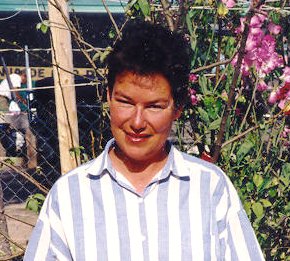 Audre Pinque in Mexico. Together with Bradley Smith she helped me to keep up my spirits while staying in Mexico. As a thank-you I helped her move back to the U.S. in late 2001, where she unfortunately died in a car accident in March 2002.
Audre Pinque in Mexico. Together with Bradley Smith she helped me to keep up my spirits while staying in Mexico. As a thank-you I helped her move back to the U.S. in late 2001, where she unfortunately died in a car accident in March 2002.
“Listen, Bradley, you drive all by yourself to Chula Vista and run your errands, while I ride a bus back to Rosarito.”
I explain my changed intentions a couple times to Bradley to make sure he understands that I am not saying this in order to dupe the official standing next to me, but that I really mean it, because there really is no reason to risk anything for a simple shopping spree.
During my bus ride back to Rosarito I realize that I really have only until November 8 in order to reenter the U.S. with my old visa waiver and in order to grab the last chance for a permanent residence in the U.S. by applying for political asylum. These are really nice prospects.
On October 16 everything is prepared. I have once more wrapped up all my things. But before we can send my belongings on their merry way, I have to manage getting across the border first – with the help of my old visa waiver. Of course I could apply for asylum right at the border without any immigration papers, but that would probably lead to my temporary confinement (if not to say arrest) and to a tentative interrogation right at that location, a stressful scenario I really can do without.
Andrew Allen has decided that I should come to him to San Francisco after having crossed the border successfully. Then we would simply send my application to the authorities by mail. Only after I will have returned from San Francisco will Bradley‘s Mexican friend bring my belongings across the border in his truck.
This time we do it all differently at the border. Bradley drives across the border in his car all by himself. We assume that it will be much easier if I arrive at the border as a pedestrian with a backpack, like a German tourist. But I also have a briefcase with me with all my asylum documents, which doesn’t quite fit into the image of a back-packing tourist. But you never know whether I will need those documents already here at the border. Bradley’s wife crossed the border as a pedestrian as well. She carries my suitcase with my clothes, pretending that she doesn’t know me. Because as a back-packing tourist I am not supposed to have a heavy traveling bag.
It is Monday evening. The border station in Tijuana is almost empty. I walk toward a Mexican-looking border official who looks rather relaxed. He has nothing to do. I pull my passport and my old visa waiver out of my backpack and shove them right under his nose, with the passport neatly opened at the page with my photo. I glances at it in obvious boredom and simply waves me through. Next I have to put both my briefcase and my backpack through an X-ray detector.
“What do you have in that briefcase? Please open it,” one of the officials asks me.
I open my suitcase nervously and leaf through the collection of asylum documents.
“These are documents,” I explain.
“I see. On the monitor it looked like money,” the official states in return. I crack up laughing with relief:
“Haha, that would be nice!”
That was probably a little bit too shrill. I wonder whether they have noticed that. But no, they all laugh too. And so I walk on, into the darkness of San Ysidro in the “promised land.”
I made it!
And I’m hungry. As much as I detest American fast food, I now enjoy eating a cheeseburger. Better a cheeseburger than Mexican cuisine… [Update 2012: After having lived in Latin American for a three quarter year during 2010/2011, I now love Mexican cuisine, but still detest fast food…]
A short while later Bradley drives me to a hotel near the San Diego airport, from where I fly to San Francisco the next day in order to surrender myself to the U.S. authorities. In San Francisco Andrew Allen checks me into an expensive hotel on the other side of the bay in Tiburon. He pays the bill and promptly gets into a marital fight with his wife over it, because she cannot forgive me that I am on good terms with Willis Carto, who she considers an enemy of her husband.
“I will survive that one too,” states Andrew. “What is important is that we get you political asylum.”
On October 19, 2000, the asylum application finally goes into the mail, together with a number of documents about my political persecution. Now it all depends on how the government will react? Will the FBI stop by with handcuffs, or will I finally be left in peace?
Some may consider me paranoid, but I have my reasons. Hardly have I settled into the home of Dr. Countess, who is so generous as to let me sleep in a small room of his house, than I receive an email sent by a support committee for a certain Hendrik Möbus. In shrill tones it describes how Möbus, a German national obviously harboring right-wing views, had asked for political asylum in the U.S. for allegedly being politically persecuted in Germany. Yet he was arrested by the FBI with such brute force that he lost a tooth and had one of his arms broken in the process. He furthermore has been kept behind bars ever since. Needless to say this email scares me a lot. In search the internet in order find out what this Möbus case is all about. It turns out that this committee has its own website, but there are also several media articles about him. I read all those article dealing with the background of his case, and after half an hour I sigh with relief.
Hendrik Möbus was a young member of a “right-wing” organization (whatever that means), and as such he had been involved in the murder of another youngster. After having served his sentence, he was released on parole under the condition that he was not allowed to become politically active or make any public statements in a “right-wing extremist way” during his probation period. No sooner had he been than he violated that condition, as a result of which the German authorities tried to re-arrest him to make him serve the rest of his term. Möbus preferred to leave the country, though, and traveled to the U.S. There he got in touch with, and found refuge among, well-known political circles of the National Alliance. He overstayed his visa waiver, hence was illegally present in the U.S. An extradition request by Germany referred to his murder case and the violation of his probation conditions, but not to any other activities or statements as such, be they political or of any other nature. Since restrictions of civil rights by probation conditions are normal and no proof for political persecution, the case was evidently not political in nature at all. And because Möbus committed a violent crime, he is excluded from applying for political asylum right from the start anyway. [As had to be expected, he was extradited to Germany on July 29, 2001.]
After discussing this with Andrew Allen, he agreed that my case was absolutely not comparable with that, because I had not committed any crime according to U.S. law and always acted legally when traveling from and to the U.S. Hence my excitement subsided rather quickly.
Toward the end of October 2000 I receive a note from the U.S. immigration services informing me that my asylum application has been formally accepted and that I will have to show up for an interview with an official of this department at the end of November 2000. Andrew Allen is delighted, for we have successfully taken the first hurdle: our application has not been rejected for some formal mistake. The case will be adjudicated …
Now it is clear that we have until the end of November in order to put my case together as good as possible: documents about political persecution in Germany in general and with respect to my person in particular are collected and translated into English with the help of a loyal friend. Without this translator, who relieves me of a major workload and does all his work for free (he even gets angry when I offer him money!), I would be financially (and also mentally) unable to prepare my case somewhat satisfactorily until the end of November. I moreover have to also have to prepare the double issue of my German magazine. Hence I cannot complain about a lack of work. Since I hardly ever get away from my computer in my small room, my “foster parents,” the Countesses, call this room the “dungeon.”
Then, on November 29, all is set. Andrew Allen and I sit with a queasy feeling in our stomachs in the waiting room of the asylum department, surrounded by all kinds of exotic looking people which apparently have similar pleas to make.
An hour later we are asked to enter an office. A gentleman – probably in his end fifties – instructs us that the asylum seeker may be seated to the left, while the attorney sits on the chair at the right. Since Andrew Allen is wearing a scuffed-up leather jacket, somewhat worn grey trousers and has a two-day beard, while I have shown up freshly shaven, with a white pair of slacks and a green silk jacket, the official doesn’t want us to sit down the way he has instructed us, though. It requires some explanation to enlighten him that – contrary to his assumptions – I am the asylum seeker and Andrew is the lawyer. This is not the only confusion we will cause this poor official, as it turns out.
“Do you have a visa for the U.S.?” the official asks me.
“No” I respond correctly, as I only have a visa waiver, which is not a visa.
“Well, have your papers not been checked at the border?” he asks in perplexedly.
“You cannot call that checking.”
“How then did you manage to get past the border official at the border?” he asked with an irritated voice.
“I held my passport and my visa waiver in front of the official’s face, and he waived me through without looking closer at my papers.”
Now he is somewhat upset, but he who asks ill-defined answers should not be surprised to get unexpected answers.
“Give me this visa waiver,” he demands. He looks at it and says gruffly, “But this visa waiver is from August, not from October.”
“If course. I received a visa waiver in August, and since U.S. border officials have told me that I should hand back a visa waiver only if it has expired or if I am leaving the U.S. permanently, I wanted to keep this one up to its expiration date.”
Now the official, with my visa waiver in hand, jumps up from his chair, runs out of his office and lets us sit there all by ourselves for some five to ten minutes. Meanwhile Andrew Allen writes down this official’s name, whose does not leave a good impression with his gruff attitude.
He finally returns, hand the visa waiver back to me and says that everything was fine. But then comes a real bummer:
“In preparation of today‘s interview I have looked around the Internet and have found out that the revisionists are all Nazis, aren’t they?” he asks me.
What a great start! I contradict and start the usual sermon about the political convictions of the most important revisionists, starting with the communist/socialist and former concentration camp inmate Paul Rassinier, then mentioning Faurisson, Butz, Ginsburg, and all the others.
“But there are Nazis among them,” he insists.
“Yes, they are there, too,” I reply.
“Now explain to me why you ask for political asylum,” is his next question. When I launch on a longwinded lecture, he interrupts me and simply states:
“Well, you obviously do that because you don’t want to go to prison, right?”
“Right,” I concur. That sounds better already, I think to myself. Subsequently he wants to know, to which conclusions I have come with my research on the Holocaust, to what conclusions my expert report has come, and upon which kind of evidence I base myself. I in turn ask myself, what the results of my research, the contents of my expert report and the multitude of evidence has to do with my asylum application. Only reluctantly do I start to explain to him the point of departure and the course of my research as well as the most important results, by so doing I get lost in details, so that after a while he loses his patience. Only later on I realize that he apparently expected some kind of political statement, but not a scientific lecture on chemical and architectonic-technical details.
This aha experience must have turned him around. The interview runs smoothly from there on. He asks one questions after the other, and when my answer is too complicated, he interrupts me and summarizes it in a way which sounds most conducive for an acceptance of my application.
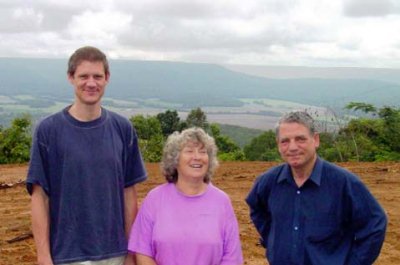 Germar Rudolf with two visitors on September 4, 2001, on the summit of Keel Mountain near Huntsville, Alabama: The Australian revisionists Olga Scully and Dr. Fredrick Töben.
Germar Rudolf with two visitors on September 4, 2001, on the summit of Keel Mountain near Huntsville, Alabama: The Australian revisionists Olga Scully and Dr. Fredrick Töben.
While discussing the other criminal investigations pending against me, the book Grundlagen zur Zeitgeschichte is mentioned as well, and I can proudly show him a copy of the English edition. He is surprised about the size of the book, that it has now also been published in the U.S., and it requires some efforts to explain to him what a scientific anthology is. Andrew and I look at each other in astonishment, not only because we notice that the official is increasingly friendly, but also because it becomes evident that his educational level is rather low (once in a while I have to explain to him English words I am using) and that he has apparently never dealt with an intellectual asylum seeker before.
“You arrived in the U.S. for the first time in November 1999. What took you so long to apply for asylum?” he asked toward the end of the interview.
“To be honest, my lawyer had a hard time convincing me to file this application in the first place. After all the experiences I have had with the authorities in Germany, I don’t trust any authorities anymore.”
He seems to be satisfied with that and then raises the last topic:
“What is it you and your fellows want to achieve? What is your goal? What are you talking about when you meet at these conferences or whatever?”
At first I am not sure what he means. But then it turns out that he assumes that the revisionists would discuss some kind of political long-term goals during their meetings and would forge out plans in this regard. I therefore explain to him that the revisionist conferences in general are no different than any other scholarly conference. Research results are being presented and discussed, but apart from civil rights issues like censorship, political correctness and political persecution, politics aren’t being discussed, except maybe in private circles and depending on the predilections of the individuals. It takes some effort to convince the official that the revisionists aren’t a group of political conspirators against some ethnic or religious group or against certain nations, but that their interest focuses on the most accurate approach possible to the historical truth. But after giving some explanations and examples about the way revisionist meetings and conferences unfold, he seems to see the light, and toward the end of the interview he jots down a list of questions and answers, which indicates clearly that the penny has dropped:
Revisionists aren‘t Nazis, but persecuted dissident scholars.
Well done! Who would have thought that at the beginning of the interview! The usual 20 minutes have usually allotted to such an interview have turned into 3½ hours in my case, and I hope that this time was well invested.
At the end I am allowed to confirm with my signature that an immediate decision is not to be expected in my case and that the decision will be sent to me by mail.
After getting back to the Countesses, I work feverishly to get the double issue 3&4/2000 of my quarterly magazine out. This is encumbered by considerable obstacles, since I have not even unpacked my moving boxes, safe a few exceptions, which are stored in some storage room. It is, after all, impossible to stay for a longer period of time in a friend’s small, dark room, which is to say that I expect to move again soon. But how am I supposed to publish a magazine issue, if I don’t have my papers accessible? Improvisation is the motto of the day!
Toward the end of December Andrew Allen calls me on the phone:
“I just had a strange phone call from the official who interviewed you. He was very polite. He said that he is unfortunately not allowed to adjudicate your case, as this is outside of his jurisdiction. But he said that he has determined that you are probably really persecuted.”
This news is more than confusing, and since Andrew Allen isn’t an expert at asylum law, we have no choice but to wait for the written decision of the immigration authorities. It gets to me in early February 2001, and the decision it both encouraging and discouraging. On the one hand, the text next to the boxes ticked in the decision say:
You have not established that you are a refugee:
- Past persecution
You have not established that any harm you experienced in the past, considering incidents both individually and cumulatively, amounts to persecution. - Future Persecution
You have not established that there is a reasonable possibility that you would suffer persecution in the future.
But then the official added a typewritten text underneath which completely contradicts the above:
“However, it has been determined that you have been found to have a credible fear of persecution in that there is a significant possibility that the harm you suffered in the past and the harm you fear in the future may be found to be persecution on account of one of the five grounds set forth in the statute.
Based on the above reasons, your case has been referred to an immigration judge. This is not a denial of your asylum application. You may request asylum again before an immigration judge and your request will be considered (without additional refiling) when you appear before an immigration judge at the date and time listed on the attached charging document..”
Another inquiry with the official cleared up our confusion: Since Germany is recognized by the U.S. State Department as a non-persecuting nation, a simple case worker of the U.S. immigration authorities cannot decide otherwise. He simply lacks the jurisdiction to recognize a German citizen as a political refugee but has to refer the case to an administrative court within the U.S. immigration services. This court will then assess the case anew.
In other words: If that case worked had been inclined to reject my application, he probably would have done it, and if I were not a German but rather a Chinese or Cuban citizen, this official would have granted my application. But because he was not allowed to do that, he added the best possible text underneath the form text and referred the case to an immigration court.
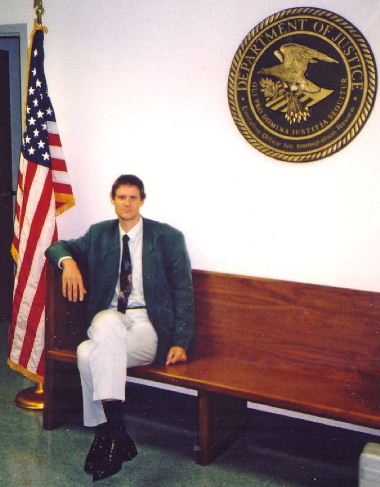 G. Rudolf in the waiting room of the offices of the U.S. Immigration Services in Atlanta, Georgia, on September 24, 2001 (not even two weeks after 9/11!).
G. Rudolf in the waiting room of the offices of the U.S. Immigration Services in Atlanta, Georgia, on September 24, 2001 (not even two weeks after 9/11!).
On April 4 the date for the hearing my case is scheduled: September 24, 2001. This extended period of time I will use in order to prepare my case professionally for the immigration court. I need a professional, reputable lawyer specializing in immigration law; experts on the deterioration of civil rights in Germany have to be found who dared to testify in a U.S. immigration court; and finally a large number of documents are waiting to be reviewed, arranged, translated and explained to my lawyer.
In the spring of 2001, after more than one year of wandering aimlessly about, my private life finally starts getting back to normal. First I try getting myself a rented home. Due to a lack of U.S. photo documents, this works only with the help of friends and by turning a blind eye to this deficiency. At the end of May I finally move into a house in Gurley, AL, a rural area east of Huntsville. There I have plenty of room to unfold my publishing activities. Dr. Countess sells me one of his almost 20 years old Peugeots, because without out there in the sticks I really depend on a car to get around. But it turns out that without a Social Security Card I can neither get a U.S. driver’s livens nor any car insurance. This obstacle is soon removed, though, when, 150 days after filing my asylum application, I file for a temporary employment permission, which is granted in June 2001. With this document in hand I swiftly manage to get a Social Security Card, which in turn allows me to get an Alabama driver’s license. As a proud owner of such a U.S. photo ID, I am finally treated like a human being by banks, insurance companies, and anywhere else in the business world. One could assume that everything is perfectly fine, if only that sword of Damocles called “deportation on rejection of the asylum application” would not be dangling over me …
In May 2001 I also resume treating my body decently. Since October 1999, when I had to leave England abruptly, I have more or less neglected my road bike. Except for jogging frequently at the Mexican beach and a few short spins around the Countess residence in late 200 and early 2001, I have basically not exercised at all. Hence and as expected, my physical shape is dismal when, early in the morning of May 5, 2001, I try to get straight up the 880 foot high Keel Mountain, which starts kind of at my doorsteps. After only two thirds of a mile I have to hoist the white flag of surrender. Thusly humiliated I initiate an ambitious fitness program: Each morning I make a 20 miles bike tour around said mountain, up to its summit, all across its ridge, and back down to my home. The 105 minutes it takes me initially to do it shrink down to some 70 minutes by the end of September 2001, and I notice with pride that I can keep an average speed of some 26 mph on flat roads. I’ve never been that fit in my entire life!
Thusly toughened up, the hearing of my asylum case approaches toward the end of September. 111 documents plus translations with a total of more than 1,500 pages have been filed by me with the court. As an expert witness for the violation of human rights in Germany in general I manage to hire the German national Dr. Claus Nordbruch of South Africa, and the German lawyer Dr. Günther Herzogenrath-Amelung, a legal expert with particular emphasis on my case, agrees to submit an expert report. Both expert witnesses travel to the U.S. shortly before the hearing in order to supplement and underscore their written reports.
And then the great day has come – with obstacles. The 9/11 attacks on the Pentagon and the World Trade result in increased security measures to such a degree that the immigration judge says it has been impossible for him to arrive in court on time. Hence the hearing starts with two hours delay by the judge reading a summary of the case which my lawyer has submitted.
The first scary thing that happens is that the prosecution (i.e. the U.S. government) files a motion to “pretermit” the case, that is to say, to throw out the case right there and then, to have me arrested in the court room and deported back to Germany. Fortunately the judge, who says he has never heard of such a motion, doesn’t accept this, and so the hearing can go its normal course. Then the two experts from Germany are allowed to testify, against the government’s objection. The court decides that their knowledge of the English language is sufficient to make to without an interpreter, which turns out to be a disadvantage at times, because neither experts possess the required fluency in the English language in order to present the entire scope of their knowledge with the linguistic elegance and power of persuasion as it would have been possible for them when using their native language.
During the cross examination of the witnesses it turns out that the U.S. government and apparently also the court opine that it is perfectly alright if German courts of law deny defendants to present evidence for factual claims for which they are being tried and which are indisputably wrong in the eyes of the court. There is also nothing objectionable about existing laws and legal procedures in Germany, since Germany is a democracy and because the people can vote for parties which could change those laws and procedures, and because these laws and procedures have been approved by the highest German courts, which are held in high regard by the entire world. O, Sancta Simplicitas!
When I enter the witness stand, it is already four o’clock in the afternoon. After a few questions and answers, and after a brief discussion, the immigration judge decides to adjourn the hearing to a second date on March 18, 2002. Since no new documents have to be prepared of new evidence has to be submitted for this new hearing, I am much more relaxed in expectation of this second hearing as compared to the first.
I’m less relaxed when receiving may lawyer’s invoices for September and October 2001, though, which amount to several ten thousand dollars. I’m not going into more detail here, but I want to take the opportunity here to thank all those loyal and generous supporters who have helped me pay those bills. Without their support it would have been impossible to sustain this case.
The second hearing of my asylum case on March 18, 2002, is defined by a much more relaxed atmosphere. Both my cross examination as well as the final speeches of prosecution and defense are undramatic. Except maybe for the fact that the prosecution seriously claims that the dissemination of (allegedly) evidently false claims about the Holocaust amounts to mentally torturing Jews(!) and thus has to be assessed as a racial persecution of the Jews, which is why “Holocaust deniers” are to be excluded from political asylum. So much about the U.S. government’s official position. Oh lord, please throw down some brains! The one positive thing about this is that the immigration judge is noticeably irritated by this, so that one may assume that this line of argument is not conducive to the prosecution’s case.
The rest of the case was dealt with entirely in writing, the documentation of which can be found on this website.



